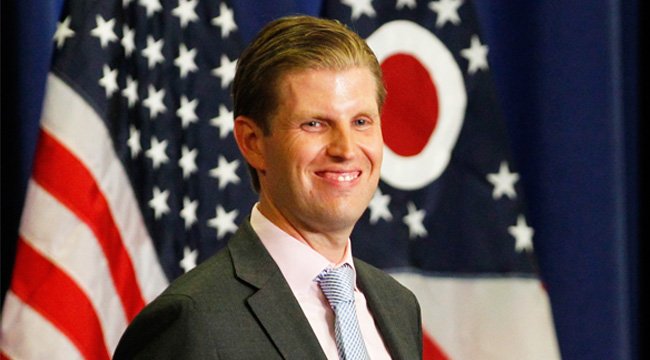
Eric Trump might have managed the most tragic misunderstanding of irony since Alanis Morissette’s infamous 1996 hit when he tried to defend the president’s decision to refer to Sen. Elizabeth Warren as “Pocahontas” in front of Navajo Code Talkers. The president’s middle son used his father’s medium of choice to explain his belief that a reporter who criticized the president’s comment as offensive can’t complain because he works for ABC, which is owned by Disney, which released the 1995 animated feature film Pocahontas . Twitter didn’t buy Eric’s take and has spent the morning positing as many rebuttals as there are colors in the wind.
The irony of an ABC reporter (whose parent company Disney has profited nearly half a billion dollars on the movie “Pocahontas”) inferring that the name is “offensive” is truly staggering to me.
— Eric Trump (@EricTrump) November 28, 2017
Eric tweeted, “The irony of an ABC reporter (whose parent company Disney has profited nearly half a billion dollars on the movie “Pocahontas”) inferring that the name is “offensive” is truly staggering to me.” Fortunately, the internet was well-armed with concrete definitions of irony and its function.
https://twitter.com/gettinnoticedmo/status/935531843692109825
First of all its the listener who infers. The speaker implies. Second, there's a massive difference between a children's movie and a racially motivated slur being repeatedly used against a sitting US Senator. Besides your father and grandpa LIED about being Swedish for decades.
— Ivye (@ivye_m) November 28, 2017
Others were happy to provide examples of what an effective, correct use of irony would look like in a sample sentence.
https://twitter.com/greenbean99999/status/935510482026422272
Dear @EricTrump The name isn't offensive if it's referring to the actual person. For instance, if I said you were as dumb as Eric Trump it's not offensive because you ARE Eric Trump. https://t.co/MmZw2Ft5Mu
— Mark Critch (@markcritch) November 28, 2017
There were also a number of tweets that broke down the difference between the opinions of reporters and those on whom journalists report, and why exactly Native Americans are offended. Altogether, Eric’s remarks don’t make much sense.
And it's not @jonkarl who calls the Pocahontas slur offensive, it's the leaders of the Navajo nations, including one who was in the room yesterday who do. The press aren't bringing their own feelings into the briefing room, they are representatives of your father's constituents.
— Ivye (@ivye_m) November 28, 2017
reducing all Native Americans to One Name Fits All is offensive. Reduces their achievements, individuality, contributions.
— Mickie Morganfield (SpringIntoAction) (@mickiedances) November 28, 2017
https://twitter.com/Kymmacg/status/935546612667043840
And others wondered if this tweet accurately reflects Eric’s knowledge of elementary American history or his IQ. Twitter is very concerned about the smarts of Trump’s large adult sons and the education they have received.
https://twitter.com/largemargesentu/status/935519294175305728
As others have noted, and I feel compelled to reiterate, you have the intellectual capacity of a ham rolled in hair.
— Teenage Phlebotomy (@lumpyprole) November 28, 2017
The Trump Large Adult Son version of sibling rivalry is that they're always trying to compete to confuse us about which one is the dumbest. I was leaning Don Jr recently, but Eric's making a strong push here. We should have leaderboards.
— @rob-sheridan.com on BSky (@rob_sheridan) November 28, 2017
Ppl can say what they want but the guy has a point. @Disney gets a pass? Why? Because you like them?
— Xai Rascal (@xai7126) November 28, 2017
Of course, this conversation mostly leaves out the often problematic portrayal of indigenous people in Hollywood (looking at you Lone Ranger) or the fetishization of Disney’s Pocahontas character (looking at you, Nicki Minaj). Regardless of the critical reception and cultural legacy of Pocahontas, however, it wasn’t unreasonable to title the movie after its heroine. To suggest a reporter wasn’t right to ask a question because he works for a company owned by a conglomerate that made a movie twenty-two years ago, well, Twitter has spoken.
